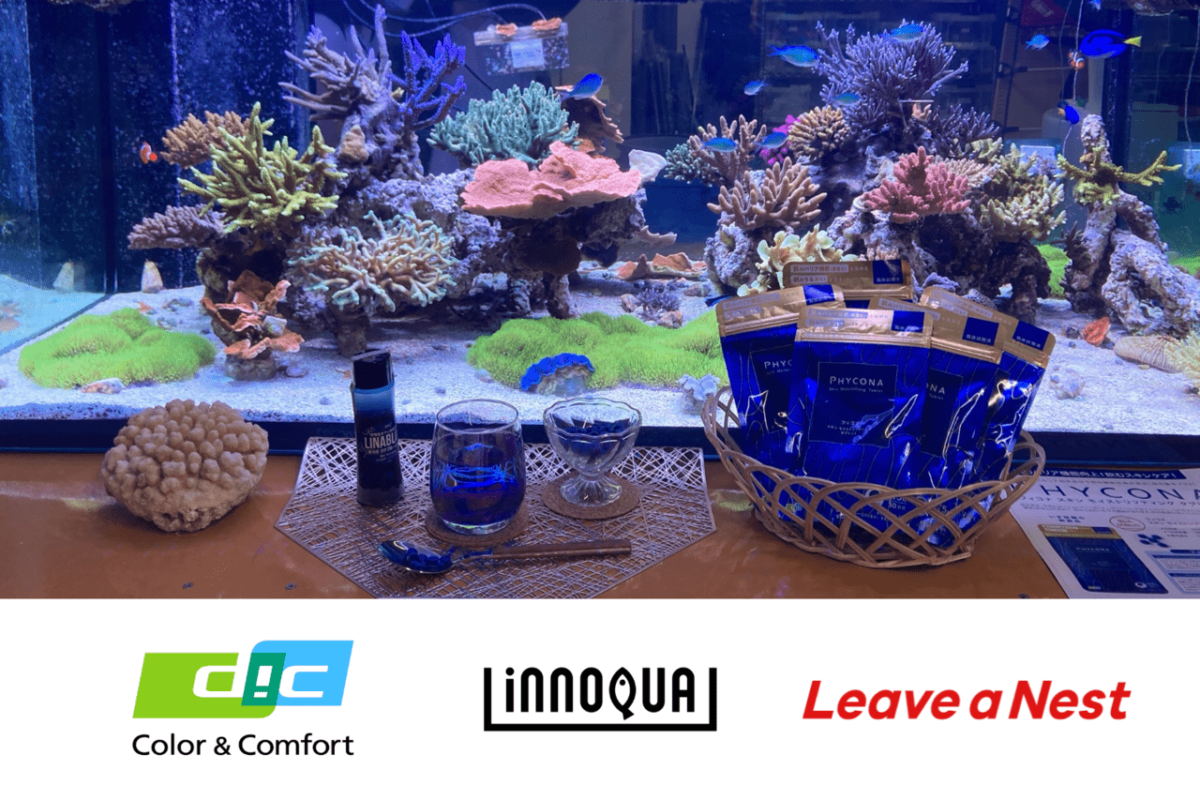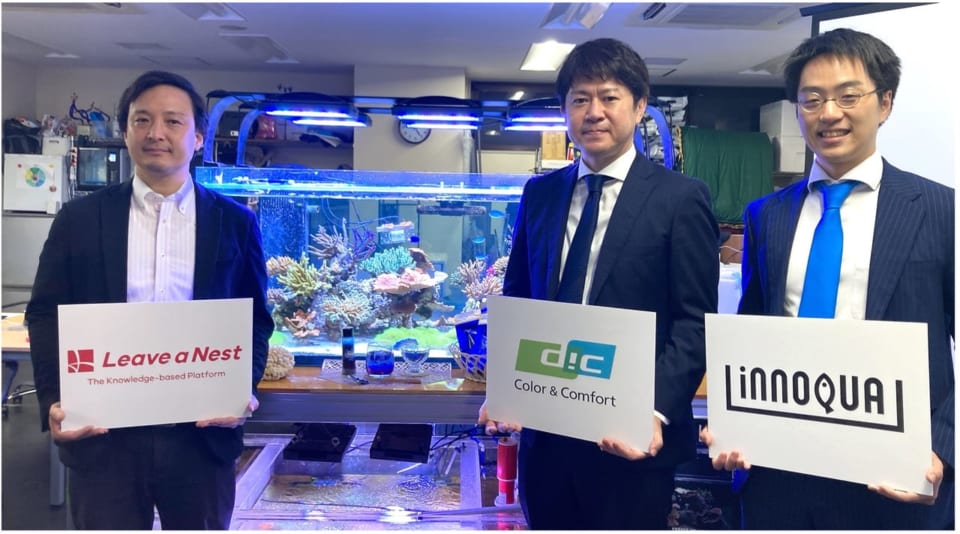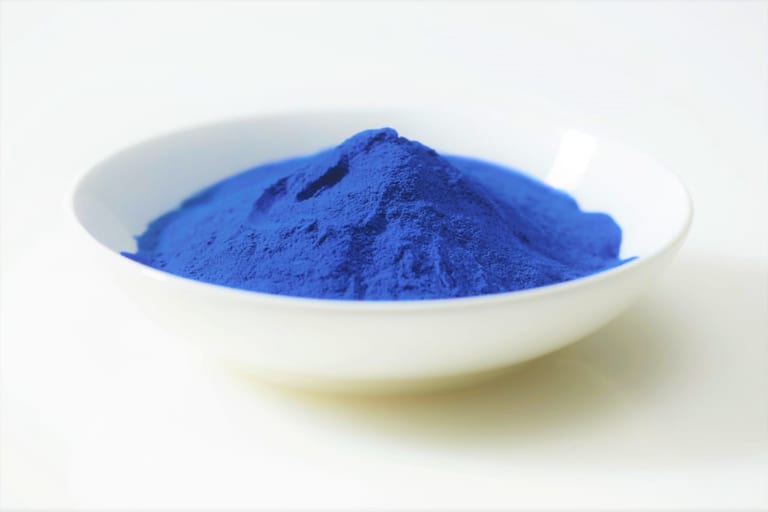“Environmental Transfer Technology” Company Innoqua and Fine Chemicals Manufacturer DIC to Commence Research into Potential Uses for Spirulina-Derived Phycocyanin Using Artificial Marine Ecosystems —Leave a Nest to provide support for this initiative, which seeks to contribute to a healthy planet—

“Environmental Transfer Technology” Company Innoqua and Fine Chemicals Manufacturer DIC
to Commence Research into Potential Uses for Spirulina-Derived Phycocyanin Using Artificial Marine Ecosystems
—Leave a Nest to provide support for this initiative, which seeks to contribute to a healthy planet—
Innoqua Inc.
DIC Corporation
Leave a Nest Co., Ltd.
Innoqua Inc. (Head Office: Minato-ku, Tokyo; CEO: Mr. Takakura Yota; hereafter “Innoqua”), DIC Corporation, (Head Office: Chuo-ku, Tokyo; CEO: Mr. Kaoru Ino; hereafter “DIC”) and Leave a Nest Co., Ltd. (Head Office: Shinjuku-ku, Tokyo; CEO: Dr. Yukihiro Maru; hereafter “Leave a Nest”) announced today that they will commence joint research into the effects on marine ecosystems of natural blue pigment phycocyanin* derived from Spirulina cultivated by DIC.

Press conference announcing the project (from left: Dr. Yukihiro Maru, CEO of Leave a Nest; Group Manager Daisuke Tagawa of DIC; and Yota Takakura, CEO of Innoqua).
With the support of Leave a Nest, DIC and Innoqua will raise corals using the latter’s core “environmental transfer technology”, which facilitates the recreation of specific marine ecosystems in closed environments (aquariums) and ascertain phycocyanin’s effectiveness in suppressing coral bleaching.
While coral reefs account for only 0.2% of the total surface area of the earth that is covered by oceans, they are home to approximately 25% of marine plant and animal life (approximately 100,000 species), underscoring their importance to ocean biodiversity. In addition to providing coastal protection and fish habitats, both vital to human life, and materials used in construction, as well as in everyday tools, coral reefs have lately attracted increasing attention as a source of pharmaceutical ingredients. The annual economic value of the world’s coral reefs is estimated at $375 billion (approximately ¥43 trillion).
However, owing to climate change and the resulting increases in seawater temperatures, current projections suggest that between 70% and 90% of the world’s coral reefs are at risk of being lost over the next two decades. Thermal and solar radiation stress impairs the photosynthesis of zooxanthellae, symbiotic microscopic algae that live in the tissue of corals and give them their color, triggering an overproduction of toxic reactive oxygen species (ROS), which causes the zooxanthellae to be expelled. The resulting loss of color renders the coral skeleton clearly visible, making the coral appear white. If the bleaching persists, the corals die, and the rich marine ecosystems they support collapse. Conserving the world’s coral reefs and their ecosystems will remain an urgent global issue in the years ahead, critical to maintaining marine biodiversity and the economic value it generates.
Recent reports indicate that researchers have succeeded in isolating a symbiotic bacterium that improves the tolerance of zooxanthellae to thermal and solar radiation stress and that this bacterium biosynthesizes a natural pigment with potent antioxidant properties. Photosynthetic blue pigment phycocyanin extracted from Spirulina, the focus of the new initiative by DIC and Innoqua, has been shown to have excellent antioxidant properties. Phycocyanin’s health benefits are the subject of extensive basic research and clinical studies, principally in the Americas and Europe, and the number of related scientific papers published has begun to increase dramatically. There have also been reports on the results of research into the impact on the body weight and color—i.e., amount of skin pigmentation—of farmed fish fed a phycocyanin-enhanced diet.
Such efforts prompted the decision by Innoqua and DIC to capitalize on the former’s core technology to verify the effects of DIC’s Spirulina-derived phycocyanin on corals raised in an artificial marine ecosystem created in an aquarium. The two companies’ research will include looking at whether phycocyanin’s antioxidant properties and its light-filtering capability when dissolved in seawater are effective in suppressing coral bleaching, as well as whether corals absorbing phycocyanin emit red fluorescence and block specific wavelengths, thereby inhibiting solar radiation stress.
In the future, the partners will also explore phycocyanin’s potential for use in the protection of marine ecosystems. This will include exploring the pigment’s impact on the growth and color of fish in such ecosystems, as well as confirming its antibacterial activity, linked to its redox properties, against pathogenic bacteria in marine organisms.
Innoqua, with its proprietary “environmental transfer technology”, DIC, which conducts R&D aimed at leveraging useful substances extracted from algae, and Leave a Nest, which supports innovative R&D, will continue working together to identify new uses for phycocyanin. Through such efforts, the companies will seek to contribute to the health not only of people but also of the planet and its ecosystems.
*Phycocyanin is a photosynthetic pigment found in cyanobacteria (blue-green algae) such as Spirulina. Phycocyanin efficiently absorbs red light even in water and uses carbon dioxide and water to produce the nutrients it needs. In 2013, it became the first natural blue food coloring to be approved by the U.S. Food and Drug Administration. Since then, demand has increased exponentially, particularly in the Americas and Europe, which have seen a rapid shift in consumer demand toward natural food colorings. In recent years, phycocyanin’s antioxidant and other functional properties have also attracted attention.
In 2013, it became the first natural blue food coloring to be approved by the U.S. Food and Drug Administration. Since then, demand has increased exponentially, particularly in the Americas and Europe, which have seen a rapid shift in consumer demand toward natural food colorings. In recent years, phycocyanin’s antioxidant and other functional properties have also attracted attention.
- About Innoqua Inc.
A venture company established in 2019 with the stated vision of “Creating a world where people and nature can coexist in harmony for the next 100 years”, Innoqua Inc. uses “environmental transfer technology” to recreate specific marine ecosystems, with weather and other factors that change daily, in closed environments (aquariums). This makes it possible to obtain precise data under stable conditions, enhancing the visibility of the planet’s oceans. Innoqua recently collaborated with various partners to conduct research to assist environmental restoration in Mauritius, including by protecting rapidly disappearing corals, in the wake of a major oil spill. On February 16, 2022, the company became the first in Japan to succeed in artificially spawning coral in a closed environment in mid-winter.
Related link: MOL Announces Initiatives Aiming for Recovery of Environmental Damage from the Wakashio Incident, and to Contribute to the Mauritian Community
- About DIC Corporation
DIC Corporation is one of the world’s leading fine chemicals companies and the core of the DIC Group, a multinational organization recognized as a global leader in the markets for a variety of products. In the 1970s, DIC became the world’s first successful commercial producer of Spirulina. Since then, the Company has worked to develop and commercialize a wide range of health-improving products. In recent years, phycocyanin, a pigment–protein complex found in Spirulina, has been shown to have outstanding functionality, including potent antioxidant properties, underscoring its promise as an ingredient that contributes to human health. DIC has established a method for extracting phycocyanin at its own Spirulina farms that does not require the use of organic solvents, thereby reducing the environmental impact of this process.
- About Leave a Nest Co., Ltd.
A group of researchers, Leave a Nest Co., Ltd., was established with the vision of “Advancing Science and Technology for Global Happiness.” The company seeks to combine science and technology from academic institutions and companies with know-how from different fields to create projects that contribute to the earth. The Company identifies its core competency as “science bridge communication”. Since 2014, Leave a Nest has been working to create Asia’s largest platform for discovering and fostering deep tech venture companies, and from before the establishment of Innoqua, one such venture company, has promoted efforts to assist these companies in strengthening their R&D configurations and conducting joint R&D in collaboration with major corporations, as well as providing support for educational initiatives.
